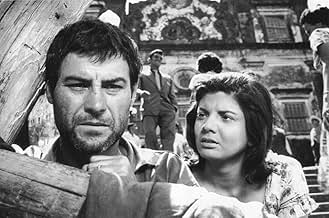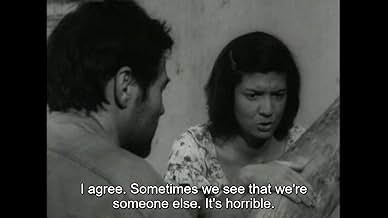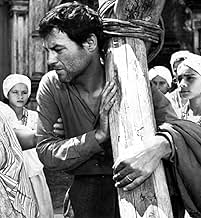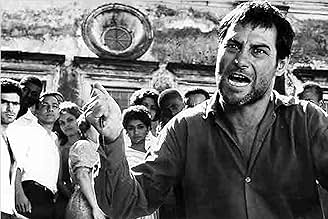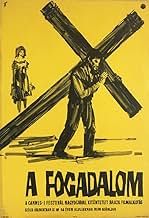AVALIAÇÃO DA IMDb
8,3/10
4,4 mil
SUA AVALIAÇÃO
Um cristão simples, mas devoto, faz um voto a Santa Bárbara depois de salvar seu burro, mas todos que ele encontra parecem determinados a entender mal suas intenções. Será que ele será capaz... Ler tudoUm cristão simples, mas devoto, faz um voto a Santa Bárbara depois de salvar seu burro, mas todos que ele encontra parecem determinados a entender mal suas intenções. Será que ele será capaz de manter sua promessa no final?Um cristão simples, mas devoto, faz um voto a Santa Bárbara depois de salvar seu burro, mas todos que ele encontra parecem determinados a entender mal suas intenções. Será que ele será capaz de manter sua promessa no final?
- Direção
- Roteiristas
- Artistas
- Indicado a 1 Oscar
- 4 vitórias e 1 indicação no total
Leonardo Villar
- Zé do Burro
- (as Leonardo Vilar)
Antonio Pitanga
- Coca
- (as Antonio L. Sampaio)
João Di Sordi
- Police Detective
- (as João Desordi)
Veveldo Diniz
- Sacristão
- (as Velvedo Diniz)
Napoleao Lopes Filho
- Bispo
- (as Napoleão L. Filho)
Avaliações em destaque
It's really a shame that this masterpiece is constantly overlooked by All-Time Greatest Lists, even though it won the prestigious Palm d'Or at Cannes.
"The Bicycle Thieves" is frequently cited as the greatest entry into Social Cinema, yet unfortunately the public and the critics seem to forget the sheer beauty that "The Payer of Promises" is. While "Bicycle"'s influence is undeniable, "Payer" goes beyond that.
Honest, multi-layered and amazingly contemporary, this is one of those movies that have admirably stood the test of time - specially if one considers the difficulty it is making Films in Brazil.
Featuring incredibly believable and dramatic performances, a rich, vivid setting and neo-realist technique employed in an elegant and sincere manner, this movie should not be missed. I found impressive how well the film flows - nothing is there gratuitously and the pacing is pitch perfect.
The amazing strength, courage and valor of Brazilian Cinema is a force to be reckoned with, as we take a look at the works of Film Makers such as Peixoto, Duarte, Rocha, Candeias, Bressane, Khouri, Salles and most recently, Meirelles. To list a very short list.
In fact, I can say without fear that it is a better Film than The Bicycle Thieves. It is easily one of the Best Brazilian Films in History - if not one of the Best in Film History. Period.
"The Bicycle Thieves" is frequently cited as the greatest entry into Social Cinema, yet unfortunately the public and the critics seem to forget the sheer beauty that "The Payer of Promises" is. While "Bicycle"'s influence is undeniable, "Payer" goes beyond that.
Honest, multi-layered and amazingly contemporary, this is one of those movies that have admirably stood the test of time - specially if one considers the difficulty it is making Films in Brazil.
Featuring incredibly believable and dramatic performances, a rich, vivid setting and neo-realist technique employed in an elegant and sincere manner, this movie should not be missed. I found impressive how well the film flows - nothing is there gratuitously and the pacing is pitch perfect.
The amazing strength, courage and valor of Brazilian Cinema is a force to be reckoned with, as we take a look at the works of Film Makers such as Peixoto, Duarte, Rocha, Candeias, Bressane, Khouri, Salles and most recently, Meirelles. To list a very short list.
In fact, I can say without fear that it is a better Film than The Bicycle Thieves. It is easily one of the Best Brazilian Films in History - if not one of the Best in Film History. Period.
A shame such an important movie has no poster here on IMDb. I wanted to add the one that is used on Wikipedia, but I would have to pay to do that. Strange. (Edit: it has a poster now.)
If you are critical of religion fanaticism, you must see this movie! It shows what can become of fanatic people, how lack of education plays an important role in fanaticism, the arrogance of the church and the hypocrisy of our society.
Zé do Burro (Joe of the Donkey) has the soul of a child. He is a good guy, but extremely naive. His naivety is shamelessly exploited, and people cruelly distort his good intentions, making an evil person out of him, when all he wanted was to do good.
The movie won the Golden Palm in Cannes and other prizes. It's a classic. Dialogs are a bit theatrical (only if you understand Portuguese), but so they used to be that time. A movie that will get under your skin.
If you are critical of religion fanaticism, you must see this movie! It shows what can become of fanatic people, how lack of education plays an important role in fanaticism, the arrogance of the church and the hypocrisy of our society.
Zé do Burro (Joe of the Donkey) has the soul of a child. He is a good guy, but extremely naive. His naivety is shamelessly exploited, and people cruelly distort his good intentions, making an evil person out of him, when all he wanted was to do good.
The movie won the Golden Palm in Cannes and other prizes. It's a classic. Dialogs are a bit theatrical (only if you understand Portuguese), but so they used to be that time. A movie that will get under your skin.
This great film, received the principal prize in Cannes and it is one of the best Brazilian films of all the times. A simple man, whose donkey was sick, gets its cure and he decides like this to pay a promise Saint Barbra, to who attributed the salvation of the animal.
Main representative of the brazilian "Cinema Novo" , the film is based on an exceptional play, and it is a realistic film, very well interpreted and driven, and it shows one on the most dramatic sides of the Brazilian people: the fidelity in paying a promise, cost what to cost!
Main representative of the brazilian "Cinema Novo" , the film is based on an exceptional play, and it is a realistic film, very well interpreted and driven, and it shows one on the most dramatic sides of the Brazilian people: the fidelity in paying a promise, cost what to cost!
The only old thing about this movie is its release date. It's very contemporary and universal. O Pagador de Promessas (1962) is based on a play written by Dias Gomes and performed for the first time in 1960.
(About the first scene so not really a spoiler) Zé and his wife, Rosa, left their land, in the country, and went to the city so Zé could pay a promise he made for a saint called Santa Bárbara. He promised to carry a wooden cross all the way to the city and enter Santa Bárbara church with it if his best friend was healed by the saint. (Paying promisses is still common in Brazil ).
I won't say why exactly but the priest doesn't let he enters the church.
It might seem a minor conflict, but it's not and it escalates through the narrative in a chocking way to Zé, Rosa and audience.
Through the obstacles, Gomes criticizes many social institutions and Brazilian society as a whole in a brilliant way, mixing comedy with drama, what was totally brought to light in Anselmo's adaptation.
In this path, the acting is really important and it's fantastic.
Leonardo Villar portrays perfectly Zé certainty and naivety; Glória Menezes thought of everything, from the accent to the way of moving and the confusion Rosa shows; Dionísio Azevedo made a perfect traditional priest and everybody else were great in their respective roles, an awesome cast.
The technical features are amazing, the sets, the costume design, Duarte's shots, Chock Fowle cinematography and Gabriel Migliori scores.
What stands out in the movie is the representation of Brazilian Culture, which is what the film defends, the beautiful mix Brazil is, of European, Indian, African and many other cultures.
(About the first scene so not really a spoiler) Zé and his wife, Rosa, left their land, in the country, and went to the city so Zé could pay a promise he made for a saint called Santa Bárbara. He promised to carry a wooden cross all the way to the city and enter Santa Bárbara church with it if his best friend was healed by the saint. (Paying promisses is still common in Brazil ).
I won't say why exactly but the priest doesn't let he enters the church.
It might seem a minor conflict, but it's not and it escalates through the narrative in a chocking way to Zé, Rosa and audience.
Through the obstacles, Gomes criticizes many social institutions and Brazilian society as a whole in a brilliant way, mixing comedy with drama, what was totally brought to light in Anselmo's adaptation.
In this path, the acting is really important and it's fantastic.
Leonardo Villar portrays perfectly Zé certainty and naivety; Glória Menezes thought of everything, from the accent to the way of moving and the confusion Rosa shows; Dionísio Azevedo made a perfect traditional priest and everybody else were great in their respective roles, an awesome cast.
The technical features are amazing, the sets, the costume design, Duarte's shots, Chock Fowle cinematography and Gabriel Migliori scores.
What stands out in the movie is the representation of Brazilian Culture, which is what the film defends, the beautiful mix Brazil is, of European, Indian, African and many other cultures.
I love to watch old black and white movies and if you look for the history of foreign films up for an Oskar you find some gems like this movie. Such a real Brazilian movie and especially from Salvador de Bahia, the old capital where the cultural history of Brazil (except for the original people) is present. Colonial white oppression, the corrupt white middle class, the African people with their religious cultures and capoeira, the Catholic Church between them but like always only saving it's own position and then simple campesino who embodies the true values of human kind. In a collusion of them all, feasts, religion and fights occur and turn into a spiritual happening, a cruxifiction in which human dignity prevails. A wonderful movie from times when things seems to be clear.
Você sabia?
- CuriosidadesFirst Brazilian film to be nominated for an Oscar.
- ConexõesEdited into A Edição do Nordeste (2023)
Principais escolhas
Faça login para avaliar e ver a lista de recomendações personalizadas
- How long is The Given Word?Fornecido pela Alexa
Detalhes
Bilheteria
- Faturamento bruto mundial
- US$ 8.229
- Tempo de duração
- 1 h 38 min(98 min)
- Cor
- Mixagem de som
- Proporção
- 1.33 : 1
Contribua para esta página
Sugerir uma alteração ou adicionar conteúdo ausente

